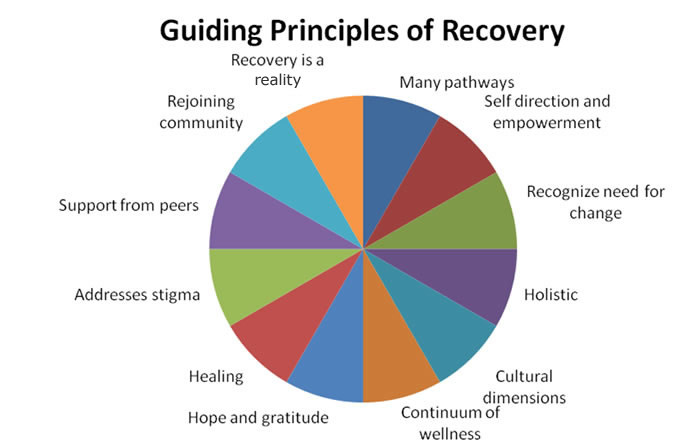In 2005 The Substance Abuse and Mental Health Services Administration (SAMHSA) convened a national summit on recovery. The following definition was decided on by summit participants. “Recovery from alcohol, drug and [gambling] problems is a process of change through which an individual achieves abstinence and improved health, wellness and quality of life.”

Principles and Elements of Recovery Oriented Systems of Care (ROSC)
ROSC is defined as “Networks of organizations, agencies, and community members that coordinate a wide spectrum of services to prevent, intervene in, and treat substance use problems and disorders.”
ROSC is for people working in
Reasons for ROSC
· Vital for recovery from alcohol, drug, and gambling addictions
· Supports individuals across life span
· Helps implement systems of measurement for recovery
· Supports research that can provide evidence based practices for working with people in recovery
Elements of ROSC
1. Person Centered
2. Inclusive of Family and Other Allies
3. Comprehensive Services Across Lifespan
4. Anchored in the Community
5. Partnership-consultant Relationships
6. Culturally Responsive
7. Responsive to Personal Belief System
8. Commitment to Peer Recovery Support Services
9. Continuity of Care
10. Inclusion of Personal Testimonies of Recovering Individuals and Their Families
11. Commitment to Peer Recovery Support Services
12. Integrated Services
13. System-wide Education and Training
14. Ongoing Monitoring and Outreach
15. Outcome Driven
16. Research Based
17. Adequately and Flexibly Financed
National Recovery Month (Recovery Month) is a national observance that educates Americans on the fact that addiction treatment and mental health services can enable those with a substance use or mental disorder to live a healthy and rewarding life. The observance’s main focus is to laud the gains made by those in recovery from these conditions, just as we would those who are managing other health conditions such as hypertension, diabetes, asthma and heart disease. Recovery Month spreads the positive message that behavioral health is essential to overall health, that prevention works, treatment is effective and people can and do recover.
Recovery Month, now in its 22nd year, highlights individuals who have reclaimed their lives and are living happy and healthy lives in long-term recovery and also honors the treatment and recovery service providers who make recovery possible. Recovery Month promotes the message that recovery in all its forms is possible and also encourages citizens to take action to help expand and improve the availability of effective recovery services for those in need.
Celebrated during the month of September, Recovery Month began in 1989 asTreatmentWorks! Month, which honored the work of the treatment and recovery professionals in the field. The observance evolved to National Alcohol and Drug Addiction Recovery Month (Recovery Month) in 1998, when the observance expanded to include celebrating the accomplishment of individuals in recovery from substance use disorders. The observance is evolving once again in 2011, to include all aspects of behavioral health and will now be known as National Recovery Month (Recovery Month).
Each September, thousands of treatment and recovery programs and services around the country celebrate their successes and share them with their neighbors, friends, and colleagues in an effort to educate the public about recovery, how it works, for whom, and why. There are millions of Americans whose lives have been transformed through recovery. These successes often go unnoticed by the broader population; therefore, Recovery Month provides a vehicle to celebrate these accomplishments.
To learn more visit: http://www.recoverymonth.gov/

